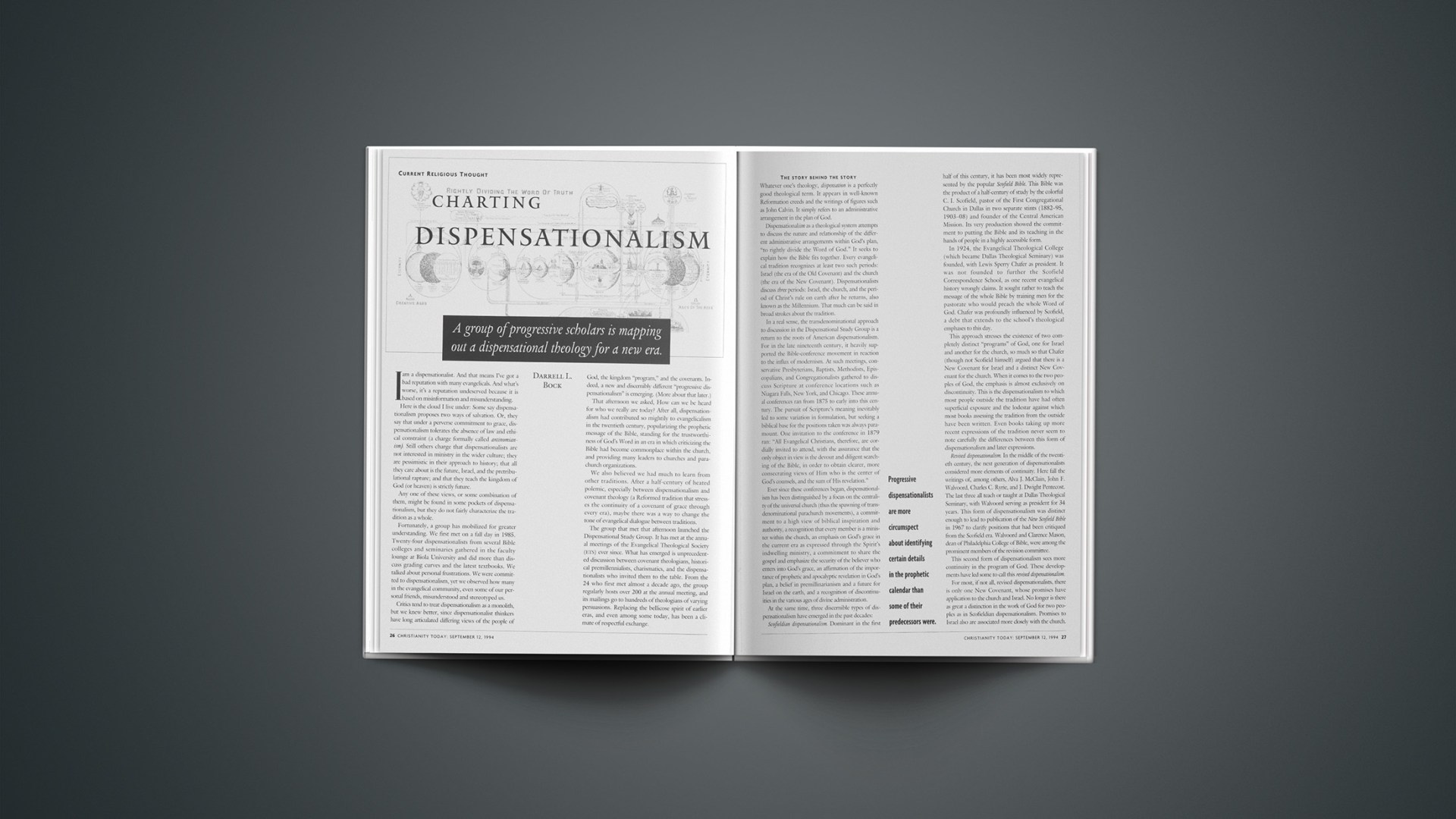I am a dispensationalist. And that means I’ve got a bad reputation with many evangelicals. And what’s worse it’s a reputation undeserved because it is based on misinformation and misunderstanding.
Here is the cloud I live under: Some say dispensationalism proposes two ways of salvation. Or, they say that under a perverse commitment to grace, dispensationalism tolerates the absence of law and ethical constraint (a charge formally called antinomianism). Still others charge that dispensationalists are not interested in ministry in the wider culture; they are pessimistic in their approach to history; that all they care about is the future, Israel, and the pretribulational rapture; and that they teach the kingdom of God (or heaven) is strictly future.
Any one of these views, or some combination of them, might be found in some pockets of dispensationalism, but they do not fairly characterize the tradition as a whole.
Fortunately, a group has mobilized for greater understanding. We first met on a fall day in 1985. Twenty-four dispensationalists from several Bible colleges and seminaries gathered in the faculty lounge at Biola University and did more than discuss grading curves and the latest textbooks. We talked about personal frustrations. We were committed to dispensationalism, yet we observed how many in the evangelical community, even some of our personal friends, misunderstood and stereotyped us.
Critics tend to treat dispensationalism as a monolith, but we knew better, since dispensationalist thinkers have long articulated differing views of the people of God, the kingdom “program,” and the covenants. Indeed, a new and discernibly different “progressive dispensationalism” is emerging. (More about that later.)
That afternoon we asked, How can we be heard for who we really are today? After all, dispensationalism had contributed so mightily to evangelicalism in the twentieth century, popularizing the prophetic message of the Bible, standing for the trustworthiness of God’s Word in an era in which criticizing the Bible had become commonplace within the church, and providing many leaders to churches and parachurch organizations.
We also believed we had much to learn from other traditions. After a half-century of heated polemic, especially between dispensationalism and covenant theology (a Reformed tradition that stresses the continuity of a covenant of grace through every era), maybe there was a way to change the tone of evangelical dialogue between traditions.
The group that met that afternoon launched the Dispensational Study Group. It has met at the annual meetings of the Evangelical Theological Society (ETS) ever since. What has emerged is unprecedented discussion between covenant theologians, historical premillennialists, charismatics, and the dispensationalists who invited them to the table. From the 24 who first met almost a decade ago, the group regularly hosts over 200 at the annual meeting, and its mailings go to hundreds of theologians of varying persuasions. Replacing the bellicose spirit of earlier eras, and even among some today, has been a climate of respectful exchange.
THE STORY BEHIND THE STORY
Whatever one’s theology, dispensation is a perfectly good theological term. It appears in well-known Reformation creeds and the writings of figures such as John Calvin. It simply refers to an administrative arrangement in the plan of God.
Dispensationalism as a theological system attempts to discuss the nature and relationship of the different administrative arrangements within God’s plan, “to rightly divide the Word of God.” It seeks to explain how the Bible fits together. Every evangelical tradition recognizes at least two such periods: Israel (the era of the Old Covenant) and the church (the era of the New Covenant). Dispensationalists discuss three periods: Israel, the church, and the period of Christ’s rule on earth after he returns, also known as the Millennium. That much can be said in broad strokes about the tradition.
In a real sense, the transdenominational approach to discussion in the Dispensational Study Group is a return to the roots of American dispensationalism. For in the late nineteenth century, it heavily supported the Bible-conference movement in reaction to the influx of modernism. At such meetings, conservative Presbyterians, Baptists, Methodists, Episcopalians, and Congregationalists gathered to discuss Scripture at conference locations such as Niagara Falls, New York, and Chicago. These annual conferences ran from 1875 to early into this century. The pursuit of Scripture’s meaning inevitably led to some variation in formulation, but seeking a biblical base for the positions taken was always paramount. One invitation to the conference in 1879 ran: “All Evangelical Christians, therefore, are cordially invited to attend, with the assurance that the only object in view is the devout and diligent searching of the Bible, in order to obtain clearer, more consecrating views of Him who is the center of God’s counsels, and the sum of His revelation.”
Ever since these conferences began, dispensationalism has been distinguished by a focus on the centrality of the universal church (thus the spawning of transdenominational parachurch movements), a commitment to a high view of biblical inspiration and authority, a recognition that every member is a minister within the church, an emphasis on God’s grace in the current era as expressed through the Spirit’s indwelling ministry, a commitment to share the gospel and emphasize the security of the believer who enters into God’s grace, an affirmation of the importance of prophetic and apocalyptic revelation in God’s plan, a belief in premillinarianism and a future for Israel on the earth, and a recognition of discontinuities in the various ages of divine administration.
At the same time, three discernible types of dispensationalism have emerged in the past decades:
Scofieldian dispensationalism. Dominant in the first half of this century, it has been most widely represented by the popular Scofield Bible. This Bible was the product of a half-century of study by the colorful C. I. Scofield, pastor of the First Congregational Church in Dallas in two separate stints (1882-95, 1903-08) and founder of the Central American Mission. Its very production showed the commitment to putting the Bible and its teaching in the hands of people in a highly accessible form.
In 1924, the Evangelical Theological College (which became Dallas Theological Seminary) was founded, with Lewis Sperry Chafer as president. It was not founded to further the Scofield Correspondence School, as one recent evangelical history wrongly claims. It sought rather to teach the message of the whole Bible by training men for the pastorate who would preach the whole Word of God. Chafer was profoundly influenced by Scofield, a debt that extends to the school’s theological emphases to this day.
This approach stresses the existence of two completely distinct “programs” of God, one for Israel and another for the church, so much so that Chafer (though not Scofield himself) argued that there is a New Covenant for Israel and a distinct New Covenant for the church. When it comes to the two peoples of God, the emphasis is almost exclusively on discontinuity. This is the dispensationalism to which most people outside the tradition have had often superficial exposure and the lodestar against which most books assessing the tradition from the outside have been written. Even books taking up more recent expressions of the tradition never seem to note carefully the differences between this form of dispensationalism and later expressions.
Revised dispensationalism. In the middle of the twentieth century, the next generation of dispensationalists considered more elements of continuity. Here fall the writings of, among others, Alva J. McClain, John F. Walvoord, Charles C. Ryrie, and J. Dwight Pentecost. The last three all teach or taught at Dallas Theological Seminary, with Walvoord serving as president for 34 years. This form of dispensationalism was distinct enough to lead to publication of the New Scofield Bible in 1967 to clarify positions that had been critiqued from the Scofield era. Walvoord and Clarence Mason, dean of Philadelphia College of Bible, were among the prominent members of the revision committee.
This second form of dispensationalism sees more continuity in the program of God. These developments have led some to call this revised dispensationalism.
For most, if not all, revised dispensationalists, there is only one New Covenant, whose promises have application to the church and Israel. No longer is there as great a distinction in the work of God for two peoples as in Scofieldian dispensationalism. Promises to Israel also are associated more closely with the church.
Revised dispensationalists do maintain distinctions, since the kingdom program today takes on a spiritual form that is detached from Old Testament promise. But all do not agree on precisely how; Walvoord, Ryrie, and Pentecost all had different angles.
This type of dispensationalism also popularized apocalyptic readings of the Bible in terms of current history. The best-known examples are Hal Lindsey’s books on prophecy, which, in the seventies, ranked among the biggest selling popular books on religion of all time. Some of the more popular authors succumbed to date setting or something very close to it, but others, though describing very detailed scenarios in a modern time frame, refused to set dates. While the most visible, this emphasis within dispensationalism has represented only a small portion of the tradition’s theological concern.
Progressive dispensationalism. Out of revised dispensationalism has emerged a third form of the movement that sees even more continuity in God’s plan. The ETS Dispensational Study Group has been composed of people associated with both revised and progressive dispensationalism, but it is within the context of the ETS meetings that the “progressives” have emerged with their own identity. The view is represented in three recent works: two technical studies, “Dispensationalism, Israel and the Church” (by Dallas Seminary professor Craig Blaising and myself, eds. [Zondervan]) and “The Case for Progressive Dispensationalism” (by Talbot School of Theology professor Robert Saucy [Zondervan]), along with a more popularly written survey by Blaising and myself, “Progressive Dispensationalism” (Victor Books).
Why the phrase progressive dispensationalism? The adjective emphasizes the fact that the various administrative periods in God’s plan reflect a progression in the realization of his promise. Each dispensation draws from and builds on promises made in the previous era(s). Each is a distinct administrative period and should not be confused with other periods in God’s plan. So, for example, Israel should not be called the church in the Old Testament, nor should the church now be viewed as simply replacing Israel in the plan of God. However, some blessings in Christ, once put in place, transcend any single period of blessing. So the merits of the Cross, the ethical call of Jesus, and the promise of the Holy Spirits indwelling reflect some of the promises Christ brings for this age and the ages to come. Alongside the discontinuities of the plan stand strong links of continuity. These notes of continuity make this form of dispensationalism more like other evangelical theological traditions.
The dispensations are therefore distinct phases in God’s plan, but the promissory covenants relate those phases to one another. God’s blessing extended to all the nations represents the decisive, initial realization of God’s promise to Abraham to bless the world through the patriarch’s seed (Gen. 12; Gal. 3). In Jesus, the Messiah, comes the initial realization of promises made to David about one who would have authority to distribute the benefits of promised deliverance to God’s people (1 Sam. 7; Ps. 110:1; Acts 2, 13; Heb. 1). The initial realization of the Spirit enables the believer to live in a way that follows God’s call to love (Jer. 31; Heb. 8-10; 1 John 3; James 2). The teaching of Jesus and the apostles involves an ethical appeal that recalls the call of the prophets to live with keen moral sensitivity to others (Matt. 9:9-13; Rom. 15:1-6).
In this era, the church’s call involves preaching a message of repentance for the forgiveness of sins (i.e., the gospel), appealing to the work of Christ, and drawing on the enablement of the Spirit. Through faith, the believer should reflect in all personal relationships the reconciliation that God has provided through Jesus for both Jew and Gentile (Luke 24:43-49, Eph. 2-3). So a ministry of compassion and outreach should characterize the church.
Interestingly, previous generations of dispensationalists were heavily involved in missionary endeavors where hospital care, educational concerns, rescue mission, and gospel work occurred side by side, a point often overlooked in the study of the tradition. Still, the gospel’s impact on the church’s testimony to society is receiving increased attention within the tradition now. Of particular concern are ministries that can reflect the multi-ethnic reconciliation that Christ’s presence in the church makes possible.
In addition, progressive dispensationalists are more circumspect about identifying certain details in the prophetic calendar than some of their predecessors were. Looking for the “blessed hope” of Christ’s return is still a motivating feature for the believer’s walk with God, but some would be less confident about the ability to lay out a detailed scenario for its contemporary fulfillment.
Despite these fresh emphases on continuity and circumspection about prophetic detail, certain other positions within this approach are parallel to previous forms of dispensationalism. Progressive dispensationalism still believes in the future of Israel in a land involving an earthly millennium and making a distinction between Israel and the church. Creation’s total restoration, however, comes only after this thousand-year period with a new heaven and earth. A pretribulational rapture (the belief that Jesus gathers the church before embarking on his return to judge the world and set up the Millennium) is still held to by the vast majority.
THE DIALOGUE GOES ON
The Dispensational Study Group is not the only place these discussions are taking place. The dialogue within the tradition and between groups has been pursued on campuses associated with the Reformed, Baptist, and Wesleyan traditions. Articles have appeared in academic journals such as “The Wesleyan Theological Journal,” the “Southwestern Journal of Theology,” “The Trinity Journal,” and Dallas Seminary’s “Bibliotheca Sacra.”
Perhaps a remark from Al Mawhinney, dean of Reformed Seminary, best summarizes what has emerged. He noted that progressive dispensationalism is not “your father’s Oldsmobile.” He goes on to urge that anyone saying “dispensationalists believe … ” should be aware of these developments before commenting on the movement.
The change of tone in the debate between dispensationalists and others shows that the frank discussion 24 dispensationalists had some nine years ago may have been of great benefit to the church at large. To be sure, differences still remain, but the way they are being discussed and evaluated is changing.
Perhaps by listening more closely to one another and searching the Scripture together we will see that some of our differences are not as great as we have imagined.
Perhaps we will find that we can be one in more than word only, even in the midst of distinct emphases. That, at least, is what this process has taught me.
********************
Darrell Bock is professor of New Testament Studies at Dallas Theological Seminary and general editor, with Craig Blaising of “Dispensationalism, Israel and the Church” (Zondervan).
Copyright © 1994 Christianity Today. Click for reprint information.










